Hi
Branislav Bujisic, product engineer
Family guy


Bad accent included

https://www.youtube.com/watch?v=_-_x7eApZKU
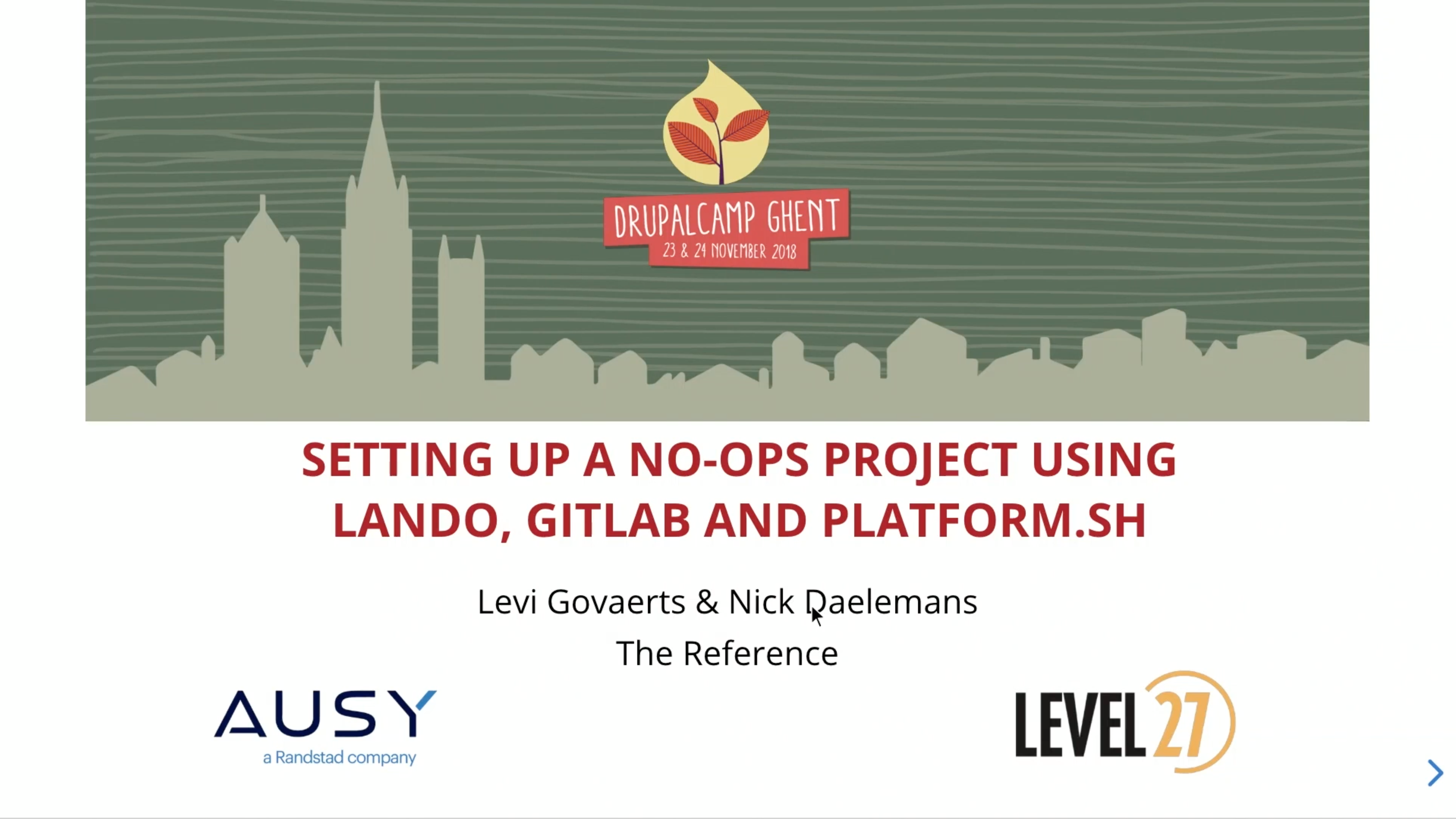
The goal:
ensure quailty of software,
through frequent and
comprehensive
testing,
while maintaining high productivity
Quality control
- Coding standards
because we need consistency - Unit tests
cover individual componets, smallest possible things to test - Integration tests
cover the interaction between components - Acceptance tests
evaluate the compliance with the business requirements - E2E tests
cover the entire flow of an app, from the start to the end
What can be automated?
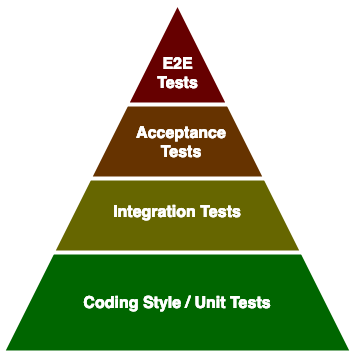
Good quality control
Continuous Integration allows you to integrate the code into a shared repository and build and test each change automatically, as early as possible, usually several times a day.
Source: https://about.gitlab.com/product/continuous-integration
Even better quality control
Continuous Delivery ensures that the software can be released to production at any time, often by automatically pushing changes to a staging system.
Source: https://about.gitlab.com/product/continuous-integration
Quality control that you really trust
Continuous Deployment takes the process a step further and pushes changes to the production automatically.
Source: https://about.gitlab.com/product/continuous-integration
The pipeline
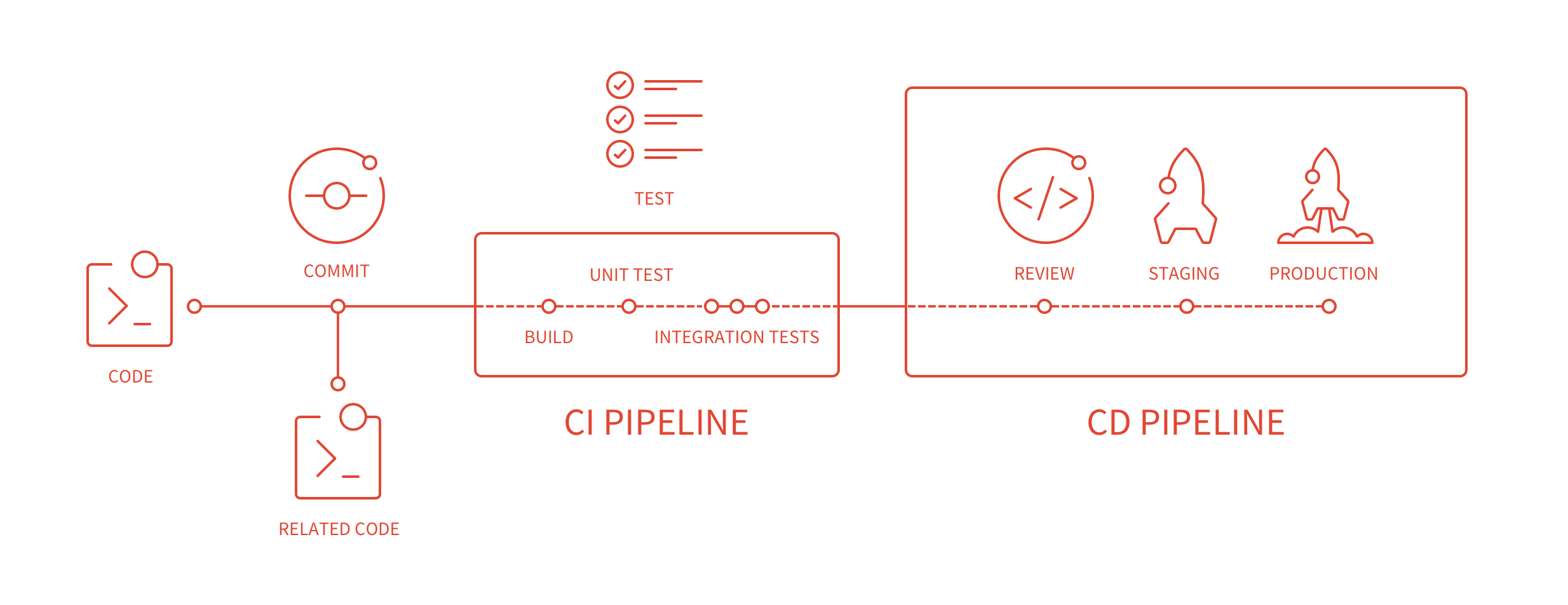
Source: https://about.gitlab.com/product/continuous-integration
Code review tools are logical candidates to run CI/CD pipelines
Lots of tools

 ...or you can try Gerrit if you feel
masochistic
...or you can try Gerrit if you feel
masochistic
 Setting up Gitlab
Setting up Gitlab
Ubuntu 18.04, 2 cores, 8GB RAM
curl -LO https://packages.gitlab.com/install/repositories/gitlab/gitlab-ce/script.deb.sh
sudo bash script.deb.sh
sudo apt install gitlab-ce# /etc/gitlab/gitlab.rb
external_url 'https://example.com'
letsencrypt['contact_emails'] = ['admin@example.com']sudo gitlab-ctl reconfigureSource: https://www.digitalocean.com/community/tutorials/how-to-install-and-configure-gitlab-on-ubuntu-18-04
 Gitlab runners
Gitlab runners
- An isolated machine (a VM, a VPS, a bare-metal machine, a docker container, or a cluster of containers).
- Picks up jobs from the coordinator API of GitLab and runs them.
- Ideally, it should not run on the same server as GitLab.
Source: https://docs.gitlab.com/runner/
 Setting up a GitLab
runner
Setting up a GitLab
runner
curl -L https://packages.gitlab.com/install/repositories/runner/gitlab-runner/script.deb.sh | sudo bash
sudo apt-get install gitlab-runnersudo gitlab-runner register| Source | https://example.com |
|---|---|
| Token | [the-token-obtained-from-gitlab] |
| Description | My Fancy Runner |
| Tags | ... |
| Executor | docker |
| Default Docker image | bbujisic/drupal8-phpunit:1.0 |
Sources:
https://docs.gitlab.com/runner/install/linux-repository.html
https://docs.gitlab.com/runner/register/index.html
 Docker
image
Docker
image
docker pull bbujisic/drupal8-phpunit:1.0- PHP 7.2, composer, Drush
- PHPCS, Drupal Coder, PHPLint
- PHP Unit
- Open source
The recipe
.gitlab-ci.yml
image: bbujisic/drupal8-phpunit:1.0
stages:
- test
phpcs:
stage: test
script:
- phpcs --standard=Drupal web/modules/custom web/themes/customOur job today is to build the functional pipeline
- You decide: group or individual work?
- You choose the tests you need and design the pipeline
Preparation
- Open a Platform.sh account, use voucher code
DDD2019 - Open a GitLab account
- Create a Drupal Umami at Platform.sh
- This deck as a reference: https://slides.bujisic.com/slides/gitlab-ci/workshop.html
Some suggestions for tasks to be automated
- PHP Parallel Lint
- PHP Code Sniffer
- Sensio Security Checker
- PHPStan
- PHP Unit
- Behat tests
- Deployment
PHP Parallel Lint
- Static analysis
- PHP Syntax checker
Installation and usage
composer require --dev "jakub-onderka/php-parallel-lint"./bin/parallel-lint web/modules/custom/Usage with GitLab CI
# .gitlab-ci.yml
image: bbujisic/drupal8-phpunit:latest
stages:
- pre-deploy-test
parallel-lint:
stage: pre-deploy-test
script:
- parallel-lint web/modules/custom web/themes/customPHP Code Sniffer
- Static analysis
- Detects violations of the defined coding standards
Installation and usage
# For Drupal developers:
composer global require "drupal/coder"
# For non-Drupal developers:
composer global require "squizlabs/php_codesniffer=*"phpcs --standard=Drupal web/modules/custom web/themes/customUsage with GitLab CI
# .gitlab-ci.yml
image: bbujisic/drupal8-phpunit:latest
stages:
- pre-deploy-test
parallel-lint:
stage: pre-deploy-test
script:
- phpcs --standard=Drupal web/modules/custom web/themes/customSensioLabs Security Checker
- Static analysis
- Runs composer.lock against SensioLabs database of vulnerable libraries
Installation and usage
php -r "readfile('http://get.sensiolabs.org/security-checker.phar');" > /usr/local/bin/security-checker
chmod +x /usr/local/bin/security-checkersecurity-checker security:checkUsage with GitLab CI
# .gitlab-ci.yml
image: bbujisic/drupal8-phpunit:latest
stages:
- pre-deploy-test
security:
stage: pre-deploy-test
script:
- security-checker security:checkPHPStan
- Static analysis
- finds errors in the code without actually running it
- Requires core and contrib dependencies to be present
Installation and usage
# For Drupal developers:
composer require "phpstan/phpstan"
# For non-Drupal developers:
composer require "mglaman/phpstan-drupal"# phpstan.neon
includes:
- vendor/mglaman/phpstan-drupal/extension.neonvendor/bin/phpstan analyse web/modules/custom web/themes/customUsage with GitLab CI
# phpstan.neon
includes:
- %rootDir%/../../mglaman/phpstan-drupal/extension.neon
parameters:
excludes_analyse:
- *Test.php
- *TestBase.php
level: 1# .gitlab-ci.yml
image: bbujisic/drupal8-phpunit:latest
stages:
- pre-deploy-test
phpstan:
stage: pre-deploy-test
script:
- composer install
- phpstan web/modules/custom web/themes/customPHPUnit
- Executes PHP code
- Unit and integration tests
- Requires composer install
- Doesn't require the state of the app
Installation and usage
composer global require phpunit/phpunitphpunit -c phpunit.xml web/modules/customUsage with GitLab CI
# .gitlab-ci.yml
image: bbujisic/drupal8-phpunit:latest
stages:
- pre-deploy-test
phpunit:
stage: pre-deploy-test
script:
- composer install
- phpunit web/modules/customBehat
- Executes PHP
- Needs the entire state of the app
Installation (1)
// composer.json
"require": {
"drupal/drupal-extension": "^3.4",
},
"config": {
"bin-dir": "bin/"
}composer update
mkdir behat
cd behat
../bin/behat --initInstallation (2)
# behat/behat.yaml
default:
suites:
default:
contexts:
- FeatureContext
- Drupal\DrupalExtension\Context\DrupalContext
- Drupal\DrupalExtension\Context\MinkContext
- Drupal\DrupalExtension\Context\MessageContext
- Drupal\DrupalExtension\Context\DrushContext
extensions:
Behat\MinkExtension:
goutte: ~
selenium2: ~
base_url: http://mysite.local
Drupal\DrupalExtension:
blackbox: ~
api_driver: 'drupal'
drush:
alias: 'local'
drupal:
drupal_root: '../web/'
region_map:
footer: "#footer"Usage
# behat/features/hello.feature
@api
Scenario: An anonymous should see the hello page
Given I am an anonymous user
When I go to "hello"
Then I should see "Hello world"cd behat; behatUsage with GitLab CI
- You need a working Drupal installation in a Docker container!
- Your Docker container should be as close to production as possible
- Long and boring setup; long and boring execution of each of the tests
- Alternative: deploy to your staging environment first, and then run the tests
Usage with GitLab CI and Platform.sh (1)
# behat/behat.yaml
default:
extensions:
Behat\MinkExtension:
base_url: http://mysite.localTo get the environment URL, run:
platform url --pipe | head -n 1Then use the BEHAT_PARAMS environment variable to override parts of the behat.yaml
file.
{"extensions": {
"Behat\\MinkExtension":
{"base_url":"[platform-url]"}
}
}Usage with GitLab CI and Platform.sh (2)
# .gitlab-ci.yml
image: bbujisic/drupal8-phpunit:latest
stages:
- post-deploy-test
behat:
stage: post-deploy-test
script: |
bash scripts/gitlab/setup-cli.sh
platform variable:create \
--name=env:BEHAT_PARAMS \
--value="{\"extensions\":{\"Behat\\\\MinkExtension\":{\"base_url\":\"`platform url --environment=$CI_BUILD_REF_NAME --pipe | head -n 1`\"}}}" \
--level=environment --json=true \
--environment=$CI_BUILD_REF_NAME \
--yes || true
platform ssh "cd behat; behat" -e $CI_BUILD_REF_NAMEDeploy to staging
Platform.sh solves the problem of staging environments and stakeholder acceptance
A new staging environment
$ git push platform my-feature-branch
$ platform environment:activate
$ platform push
Gitlab + Platform.sh
- Use the environment variables to store the ssh keys
- Setup ssh on docker container build
- Push to platform
Gitlab environment variables
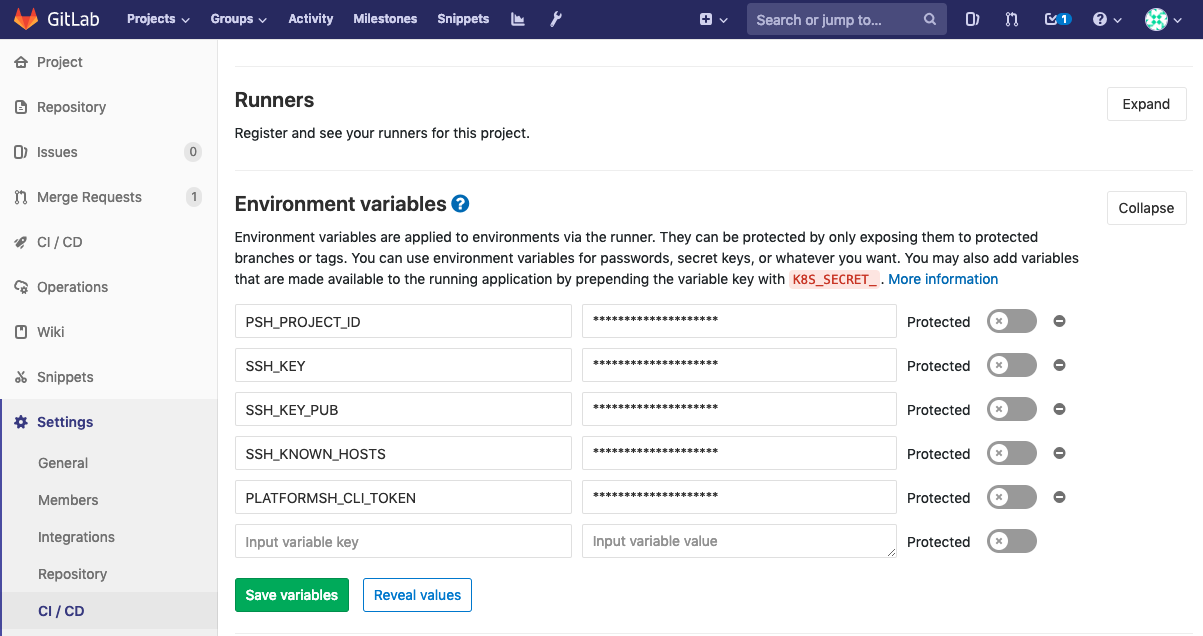
SSH setup and push
stages:
# ...
- deploy
# ...
psh-deploy:
stage: deploy
script:
- mkdir -p $HOME/.ssh
- echo "$SSH_KEY" > $HOME/.ssh/id_rsa
- echo "$SSH_KEY_PUB" > $HOME/.ssh/id_rsa.pub
- echo "$SSH_KNOWN_HOSTS" > $HOME/.ssh/known_hosts
- chmod go-r $HOME/.ssh/id_rsa
- platform project:set-remote "$PSH_PROJECT_ID"
- platform push --force --activate --target=$CI_BUILD_REF_NAMEsetup-cli.sh file: a bit of cleanup
#!/usr/bin/env bash
set -e
# Set up SSH credentials for pushing to external Git repositories, via GitLab CI
# environment variables.
if [ -n "$SSH_KEY" ]; then
mkdir -p $HOME/.ssh
echo "$SSH_KEY" > $HOME/.ssh/id_rsa
echo "$SSH_KEY_PUB" > $HOME/.ssh/id_rsa.pub
chmod go-r $HOME/.ssh/id_rsa
unset SSH_KEY
echo "Created SSH key: .ssh/id_rsa"
fi
# Set up SSH known hosts file.
if [ -n "$SSH_KNOWN_HOSTS" ]; then
mkdir -p $HOME/.ssh
echo "$SSH_KNOWN_HOSTS" > $HOME/.ssh/known_hosts
fi
platform project:set-remote "$PSH_PROJECT_ID"
# .gitlab-ci.yml
image: bbujisic/drupal8-phpunit:latest
stages:
- pre-deploy-test
- deploy-stg
- post-deploy-test
- release
parallel-lint:
stage: pre-deploy-test
script:
- parallel-lint web/modules/custom/ web/themes/custom/
phpcs:
stage: pre-deploy-test
script:
- phpcs --standard=Drupal web/modules/custom web/themes/custom
only:
- branches
except:
- master
.phpstan:
stage: pre-deploy-test
script:
- composer install
- phpstan analyse web/modules/custom/ web/themes/custom/
security:
stage: pre-deploy-test
script:
- security-checker security:check
.phpunit:
stage: pre-deploy-test
script:
- composer install
- phpunit web/modules/custom
deploy-staging:
stage: deploy-stg
script: |
bash scripts/gitlab/setup-cli.sh
platform project:set-remote "$PSH_PROJECT_ID"
platform push \
--target=$CI_BUILD_REF_NAME \
--force \
--activate
sleep 10
only:
- branches
except:
- master
phpunit:
stage: post-deploy-test
script:
- bash scripts/gitlab/setup-cli.sh
- platform ssh "phpunit -c phpunit.xml web/modules/custom" -e $CI_BUILD_REF_NAME
only:
- branches
except:
- master
behat:
stage: post-deploy-test
script: |
bash scripts/gitlab/setup-cli.sh
platform variable:create \
--name=env:BEHAT_PARAMS \
--value="{\"extensions\":{\"Behat\\\\MinkExtension\":{\"base_url\":\"`platform url --environment=$CI_BUILD_REF_NAME --pipe | head -n 1`\"}}}" \
--level=environment \
--json=true \
--environment=$CI_BUILD_REF_NAME \
--yes || true
platform ssh "cd behat; behat" -e $CI_BUILD_REF_NAME
only:
- branches
except:
- master
#
deploy-live:
stage: release
script: |
bash scripts/gitlab/setup-cli.sh
platform snapshot:create $CI_BUILD_REF_NAME
platform push \
--target=$CI_BUILD_REF_NAME \
--force
only:
- master